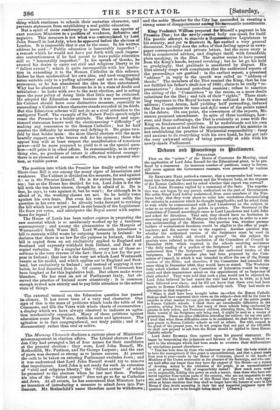The position into which the Premier has finally settled on
the Short-time Bill is one among the many signs of irresolution and weakness. The Cabinet is divided on the measure, for and against it : so is the Premier himself. He is for eleven hours, against ten ; but as the House has decided for ten, Lord John is for the bill with the ten-hours clause, though he is afraid of it. He is free, he says, to vote against it, but he won't ; for although he is afraid of it, the working classes are not. So he boldly votes against his own fears. But even his vote does not settle the question in his own mind : he already looks forward to revising the bill which has not yet passed in one branch of the Leg:islature. He fears yet votes, and anticipates the Royal assent with aspira- tions for repeal I The House of Lords has been rather copious in preparing the saw material which is so assiduously worked up by a facetious contemporary ; and among the pleasantries is the Marquis of Westmeath's Irish Waste Bill. Lord Westmeath introduces a bill to restrain wilful waste by outgoing tenants in Ireland: he declares that there is no law for the purpose in Ireland, that his bill is copied from an act exclusively applied to England and Scotland and expressly withheld from Ireland, and that it is copied verbatim. By a singular fatality, every one of those as- sertions is the very reverse of the fact : there is a law for the pur- pose in Ireland ; that law is the very act which Lord Westmeath vaunts as his model, and which applies not to England and Scot- land, but exclusively to Ireland ; and instead of copying it ver- batim, he had departed from it. Of course Lord Westmeath has been laughed at for this legislative bull. But others make worse blunders. He has read an act of Parliament laxly, but ob- served the practice of Ireland more attentively : it is common enough to read acts strictly and to pay little attention to the actual state of things.


























 Previous page
Previous page